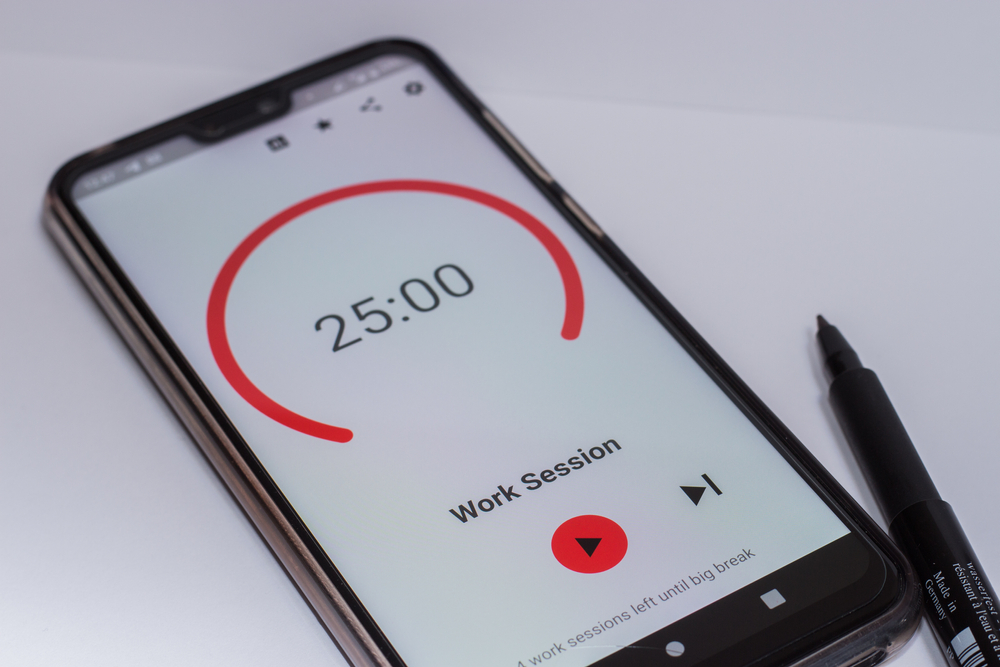Getting a master’s degree online is hard work. But when you factor in having a career and various life obligations, the true scope of the challenge of a graduate degree comes into greater focus. After all, there is only so much time in the day!
But, just because something is difficult doesn’t mean it’s impossible. Likewise, difficult things are often worth it in the end, and getting an advanced degree is certainly one of those things!
Each year, thousands of students complete their online master’s degree. How do they do it? With thorough planning, tons of support, and self-care, among other critical elements, that’s how! If you’re ready to dive into an online graduate program and need help achieving a healthy work life balance, the guide below is a great place to start. We’ll explore some work-life balance tips for online students to help make the most of your day!
See Also: Top Accredited Online Masters Degrees in the US
Prioritize Time Management

As a working student, your first order of business is to prioritize time management tips that help you make the most of your time. As you no doubt discovered when working on your bachelor’s degree, doing so involves multiple components that, when used together, will help you get far more done each day than you thought possible.
See Also: Easiest Masters Degree Online
Achieving Online Master’s Degree Balance: Create a Structured Schedule
A busy schedule can seem utterly chaotic if you don’t take the time to structure it in some way. This isn’t to say that your entire day needs to be accounted for down to the minute – doing so will likely only cause more chaos when you can’t adhere to the strict daily breakdown.
However, to achieve a good work life balance and have time for school obligations, family time, and, hopefully, some leisure time, you need to structure your daily agenda to account for all these things. Working a traditional 9-5 career means structuring your time before and after work to address your other obligations.
So, you might set aside 30-45 minutes each morning to read an article for class or discuss coursework with classmates. Then, after work, have a dedicated time to be with your family, so you have a mental health break – a time to decompress and enjoy time with your loved ones.
Your evenings might include structured time to study, say one or two hours to complete class assignments and projects. You might also identify time to work out to maintain your physical and mental health.
This is a simple case of a structured schedule. However, it illustrates that you can accomplish a lot over the day if you set realistic goals and break your day into chunks addressing the tasks you have.
See Also: Financial Aid Tips for Online College
Set Clear Boundaries
The next step in finding a balance between your full-time job, academic performance, and personal relationships is to set clear boundaries for each. This goes hand in hand with the previous point about having a structured agenda to achieve balance between work and life.
For example, it isn’t enough to establish your early mornings for academic work. Instead, you need to communicate this to your loved ones and colleagues. By setting clear boundaries that 7:00 am to 7:30 am is for schoolwork, your family, friends, and work colleagues are more likely to let you have that time without interruption.
But clear boundaries aren’t just for establishing time for your work or studying online. You also need to have clear boundaries for personal time. These boundaries are likely less for others and more for yourself – you need to establish that your academic work and career don’t leak into your personal time. After all, without enough time away from school and work, burnout is much more likely.
The question is, how do you develop the habit of a work life balance with clear boundaries? Managing work and online studies will be easier if you:
- Have a dedicated study space at home. Discuss with your family that you need to be left alone when you’re in your schoolwork space. Your study habits for remote education will do no good if you don’t have a quiet, defined space to study!
- Avoid bringing work home. Instead, work on being more efficient at work so you don’t bring it home with you that must be completed by the next day. If you work from home, try segregating your school and workspaces. This might be as simple as putting your work away when you’re studying and your study materials away when you’re working.
- Unplug from work after hours. Resist the urge to check your work email or answer work-related calls after hours to the extent possible. Likewise, avoid working on projects or other class requirements when at work. Our lives are hectic enough – a moment or two away from technology can help rejuvenate you and lead to improved mental health.
- Learn how to say no. The ultimate way to establish clear boundaries is to know your boundaries. Don’t take on too much at work or with your degree. Trying to be a superhero that does it all will only cause your boundaries to fall apart, your personal care to diminish, and stress to increase.
- Consistently evaluate your boundaries to seek improvement. The boundaries you set aren’t in stone. Evaluate what’s working and what isn’t and address the latter to be more productive.
See Also: How to Choose an Affordable Online Master’s Program
Utilize Technology and Tools

Getting an online degree necessitates that you have a good relationship with technology. Your required courses undoubtedly require that you utilize technology for the basic essentials of your degree – receiving and submitting assignments, communicating with classmates and faculty, and conducting research, to name a few.
But you can also harness the power of technology to help you manage the tasks of your school programs and career responsibilities. A few highly recommended options for students are outlined below.
See Also: 12 Real-World Strategies for Applying Your Online Interior Design Degree
Focus Keeper is a great option for time management for online learners. The app helps organize your daily workflow with a timer to work for 25 minutes. Then you take a five-minute break. You repeat this process three times, then take a longer break, 20-30 minutes. By structuring your time in this manner, you can organize your day more effectively and get more done while still getting the mental breaks you need to stay sharp.
Trello is a task-management app ideal for students and professionals to organize daily, weekly, and monthly goals. You can develop multiple project boards, add and update details, devise workflows, and much more. The changes you make sync to all your devices, too. If your goal is to improve your online master’s degree productivity, Trello is a must.
Evernote is a must-have tool for online students and professionals. Evernote is a digital note-taking app that allows you to make notes with images, audio files, and other digital assets. You can share your notes with others, so it’s great for collaborating on online projects with other students. It’s also beneficial for employers to get everyone on the same page for complex projects.
Freedom helps direct your attention by blocking your social media accounts while working. It can also block streaming sites, shopping sites, and anything else that might distract you from completing the task at hand. You can block sites for a specific timeframe (e.g., a couple of hours) or via a customizable schedule as you determine is necessary.
Each class you take will have many academic resources. Still, if you need to brush up on skills or want to expand your understanding of a topic, Coursera is an excellent resource for students.
Coursera students choose among thousands of courses that run the gamut from economics to biology to international relations. There are no class times – everything is in a work-at-your-own-pace format (though most classes have set deadlines for completing tasks). If you plan ahead, you can develop a workflow on a weekly basis that accounts for your degree requirements, your extracurricular work on Coursera, and your work and life obligations.
Develop Effective Study Habits

It’s safe to say that most students do not have effective study habits. It’s one thing to plan ahead and set aside study hours. It’s another thing to implement online graduate program success strategies that make that time valuable. The following strategies can help:
- Divide large tasks into smaller ones. “Chunking” not only diminishes the stress of facing an enormous task but also enables you to get hyperfocused on the smaller components of a larger goal. Think of it like creating a to do list of small tasks that will help you achieve a larger goal.
- Learn about your learning style. Effective study habits are different for each person. For example, if you’re a visual learner, rewatching lecture videos might be more helpful than for a student that’s a tactile learner. Understand how you best learn and maximize your study time by using those techniques.
- Try the Pomodoro Technique. The Focus Keeper app discussed earlier utilizes the Pomodoro Technique – a sequence of 25-minute work sessions followed by a five-minute break. This method of zeroing in on how much time you work effectively minimizes distractions, maximizes productivity, and divides bigger tasks into smaller ones.
- Be an active learner. Engaging with the material you’re learning helps you explore the subject more deeply. Ask questions. Be inquisitive. Offer your thoughts. Take a few moments to reflect on what you’ve learned. Take notes and review them. These active learning strategies can help you retain more information and make your study time more valuable.
Create a Support Network
Balancing work, school, and personal obligations isn’t something you have to do on your own. Instead, having a support network is crucial for your success. The best approach is to have a support network that spans the various aspects of your daily functioning and helps you with navigating online degree challenges.
Workplace Support
The first step in building a professional support network is communicating to your colleagues and supervisors that you’re working towards your master’s degree. In doing so, you can work together as a team to accommodate your college experience.
So, a colleague might cover for you at work if you have an early school obligation. Likewise, you might arrange with your supervisor to take a shorter lunch so you can leave work earlier to get home and begin your studies.
But a support network at your job is more than accommodating your schedule or covering for you. Building a network of peers and mentors gives you a wealth of experience and expertise to draw from. The people who support you at work might have tips for balancing your career, school, and personal obligations. They might also provide insights for improving your productivity while you’re at work. Use their expertise to your advantage!
Building Support Network for Online Students
One of the best features of online higher education is that programs have built-in academic support. Not only can you lean on the expertise of your professors at your graduate school, but you can also reach out to other graduate students (or a teaching assistant) for helpful tips to avoid procrastination, improve attention, and generally achieve a better work and study balance.
On top of that, online learning platforms have features like 24/7 tech support, access to an academic advisor, and services like tutoring and other helpful information. Use these and other student services to help you stay on track with your studies.
Personal Support
When you’re stressed, you can turn to your friends and family to be a sounding board. They can help proofread your work or even assist you with finishing projects. Likewise, your personal network can ensure you tend to your physiological health and emotional needs, too.
Make Self-Care a Priority

Maintaining your physical and mental health should be one of our core values. Yet, it’s one of the first things that’s neglected when you have to balance work and getting an education.
Making self-maintenance a priority doesn’t have to be difficult, though. It’s surprising how five or ten minutes here and there throughout the day can help you stay centered and more aware of your feelings. Below are some self-care strategies for online graduate students that address mental needs, physical needs, and help you develop healthy habits.
Learn how to relax
If you feel overwhelmed with stress, start small by taking a few moments to step back, rest, and relax is important. Deep breathing exercises, meditation, and mindfulness training are all excellent avenues for combatting the effects of stress and improving the overall quality of your life. Likewise, these techniques can help you fall asleep more quickly and get improved sleep throughout the night.
Seek Mental Health Care When Needed
We all have our limits of what we can handle on our own. Sometimes, we need help from a professional to process stress, anxiety, and emotions and to provide more insight into why we’re feeling or behaving the way we are.
What’s more, things can seem so bad that you develop imposter syndrome – an anxious situation in which you don’t feel much internal success despite ample external evidence to the contrary. Of course, imposter syndrome isn’t the only mental health concern you might face. Depression and anxiety are common across all demographics. Less serious issues might be increased worry, lack of sleep, and a propensity to forget things.
If self-help isn’t doing the trick for helping you manage day-to-day living, or if you’re beginning to feel like you can’t cope, take the necessary steps to get mental health care and other resources.
Attend to Your Physical Health
Finding time to go to the gym, amongst everything you must do, can be extremely difficult. But you don’t have to spend an hour a day in a hard workout to address your physical health needs.
If you’re crunched for time like most people, take five minutes to do something other than sit at your desk. Do a few simple stretches. A short walk – just 10 minutes or so – can help you decompress (both mentally and physically). You might also walk your dog, play with your kids in the backyard, or do a quick yoga session.
The key here is to be consistent and develop a routine. Regular exercise each week makes your body more capable of withstanding the rigors of sitting in front of your computer doing schoolwork. It also helps you clear your mind and reduce stress levels, helping you to be more productive and successful.
Eat Right
Eating a balanced diet offers many different benefits that will help you improve your ability to work and study. A healthy diet:
- Boosts immunity to illness
- Promotes improved digestive health
- Strengthens bones and supports muscles
- Helps maintain a healthy weight
Eating right also helps lower the risk of heart disease, type 2 diabetes, and some cancers. In other words, the healthier you eat, the healthier you will be, and the more capable you will be of performing well as a student and an employee.
Be Adaptable and Resilient

As noted earlier, having a structured schedule and defined boundaries are helpful to you as you pursue higher education while working full-time. However, you must be adaptable in determining your agenda and boundaries.
A great example of this is being open to adjusting your schedule as needed. Perhaps your initial schedule has you working on graduate school coursework late at night from 9:00-11:00 pm. However, in practice, you might not have the mental energy to devote to your studies at that hour.
So, adapting your schedule to study earlier might be advisable. You may go to bed earlier to get more rest and get up earlier to do your schoolwork before the workday begins. Or, you might study until 10:30 pm each weekday, then complete your studies on the weekend with fewer time constraints.
It’s necessary to be flexible with work, too, in case you haven’t noticed! You’ll have to work early on occasion. There will be some late nights on the job as well. Deadlines might shift. Colleagues might get sick. You have to be adaptable to all of these eventualities in your work community.
The same goes for your home life. No matter how much you try to schedule your day, other responsibilities always come up – kids need rides, your significant other has to work late, or the dog gets sick. Developing resiliency to roll with the punches is essential for managing all the components of your life.
Celebrate Small Victories
Earlier, the suggestion was made to “chunk” your day as part of building a structured schedule. The same principle is effective in breaking down long-term tasks at work and school so you can celebrate periodic small victories.
There’s a lot of value in acknowledging the steps you take to achieve a major goal. On the one hand, it helps you feel a sense of accomplishment that motivates you to keep your nose to the grindstone. On the other hand, it also helps you maintain an optimistic focus on what you want to achieve in the next few years.
You don’t need to throw a party every time you complete a task. But giving yourself props for ticking one more thing off your to-do list is an excellent way of spending your time. So, treat yourself to a coffee on your way to your job after getting a new client. Set up a time to meet with other students to celebrate the halfway point of your graduate program. Get with your family and plan a time during the week to get ice cream to recognize new skills you’ve learned in school. Anything that gets you out of your routine and takes note of your accomplishments is worth your time.
These are simple ways to celebrate your accomplishments with work and study obligations. Still, they do wonders for helping you maintain the positive attitude needed to power through challenges and address the next career or educational goal.
Seek Help When Needed
One of the fastest ways to burn yourself out is to try to shoulder the responsibility of doing everything. That’s why the earlier suggestion to learn how to say no is so important. There’s only so much you can do in class and in your career!
Fortunately, the prior step of building a support network makes it much easier to ask for help when you’re in a jam. If you’re stuck on an assignment for school, ask classmates or your professor for help. If you need help meeting a work deadline, contact colleagues for assistance. If your stress level is sky-high, seek guidance from a school counselor or outside assistance from a mental health provider.
Don’t wait to reach out for help, either. As noted earlier, leaning on others is essential for your success. Having others to lean on will help you address the challenges before you, lessen your worry, and generate a routine that makes you more successful at work and at university.
While it’s your name on your office door and your name on your diploma, achieving your educational and professional goals isn’t solely on your shoulders. Instead, you can rely on the expertise and support of your friends, family, colleagues, classmates, and professors to help you reach the finish line.
